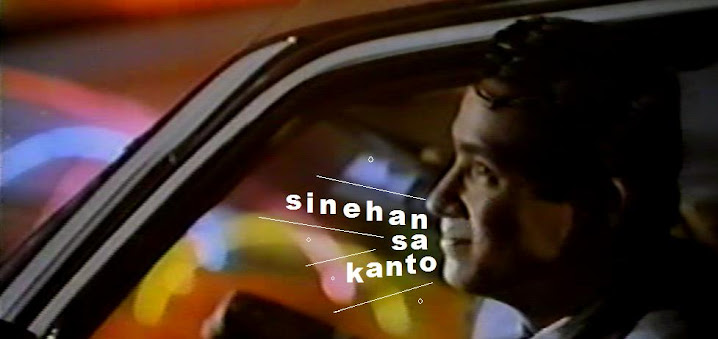
OK, this is kinda rough. I just decided to start typing and whatever I typed--unedited and all--you see here now.
Brocka's Cadena de Amor is a very hard movie to describe. Unlike Santiago before it and Tinimbang Kan Ngunit Kulang after it, it is very straightforwardly a melodrama, a dramatic entanglement between three people trying to wrestle with a bitter past. It exhibits no external politics, no forceful discourse, no obvious movement towards a “revelation.” Simply, Brocka had three people work their way out of the mess they are in, and the film ends when they do just that. The film opens with a betrayed bride: Sonya (Rosemarie Sonora) is cruelly abandoned by a confused groom (here nameless, a brief appearance by Mario O'Hara, who also wrote the film's screenplay; possibly a reference to O'Hara's gay character in Tubog sa Ginto?) and suffers a mental breakdown. She puts a coffin(!) in her family's living room and forbids the servants to use any form of lighting brighter (and cheerier) than candlelight. This culminates when Reigdor (Dante Rivero), an insistent suitor, after witnessing Sonya's decrepitude, proposes that he rapes her to get her out of her funk. Sonya's mother agrees, and so does he. Of course, she struggles, and Brocka uses a prolonged scene in slow-motion and stolen music from Psycho to illustrate what a repugnant act this is, but at the same time shockingly why Sonya badly needs Regidor's violation. (It's a sickening notion really, that raping a woman will somehow lead to a revelation of herself to herself, but the film is what it is.)
Unfortunately (or fortunately), Sonya rejects Regidor. When Sonya finally falls in love with him, it is too late and Regidor flies to the US to start anew. However, his plane crashes into the sea and he survives, washed into a wealthy family's beach-front property. In comes Rossannna (Hilda Koronel), a cripple who falls in love with Regidor as she nurses him back to health. Rossannna of course has issues of her own: when her boyfriend is killed fighting in Viet Nam, she tried to kill herself. Failing in doing so, she ends a cripple, but only in her mind: the doctor repeatedly tells her that she can walk if she only thinks she can. When Regidor (now called Dante, because he couldn't remember anything, and Rossanna chooses to name her after an absent older brother) wakes up, he falls in love with her and becomes an inspiration for Sonya to walk again. One afternoon, after the couple gets off a boat after an escapade to god knows where, Regidor/Dante trips and hits his head onto a rock (again; the doctor points out: “why of all places do you always injure your head?”). He wakes up, but a changed man: he remembers Sonya, knows also Rossanna, and finds that he loves them both. By this time, his love for Rossanna strengthens when he finds out that she learned to walk in the effort to save him.
Rossanna's family and Regidor (he now tells them his real name) now travels back to Manila. Summer is over, and the escapade makes way to the congested streets of the big city, and the complications of people—baggage and all—must deal with each other and each other's realities. Regidor for a time goes back and forth between Rossanna and Sonya, under his mother's disapproval. Seeing how much her son is suffering, Regidor's mother finally calls in both women and tells them about the situation. Of course they are both shocked, and Sonya threatens to fall apart again, but Rossanna decides that it is Sonya and not her who needs Regidor the most. She concocts a plan where a family driver poses as her former love back from the death, and informs Regidor that she will marry her long lost lover. When Regidor finds out, he leaves Rossanna's life and marries Sonya.
Now that I've got that out of my system, we can see the parallels between this movie and what seems to be one of the main themes of some of his more notable films: from Santiago to Tinimbang Ka Ngunit Kulang, Maynila to Gumising ka Maruja, Ina, Kapatid, Anak to Angela Markado, we see that one of the driving force behind actions and motivations is the weight of the past lived and relived through memory. And the past isn't just an ordinary subjective reality that repeats itself like a Freudian trick, but rather something that has become expressed not only through the characters' subjective realities, but also manifested in the systematic conditions that normalizes certain forms of reality. In short, the pain isn't just coming from one point (a certain event that occurred in the past, a person that has caused grief at one point), but rather weaved into reality to the point where pain becomes the very essence of reality. There is not anymore “identity,” only beings trying to muck through a world of pain, dictated by the horrors of their past. Of course, one could argue that “identity” is just that, an individual trying to find the boundary between the self and the world, where the earth ends and being begins. But for Brocka, the main tension happens when the being finds the very shape that she must differentiate out of the world, amorphous that shape may be. The end result may be tragic: in Maynila, Julio (Bembol Roco), in the process of finding himself amidst the systems of human interaction that define the concrete jungle of Manila he is swallowed back into the shadows of the city. In Cadena de Amor, it is Rossanna's character that successfully defined itself amidst the pain of the past manifesting itself in the present. Like Santiago (Fernando Poe, Jr.), Rossanna, ever the Heideggerian character, bravely pushes the past to the forefront and faces the future with full acknowledgment of the magnanimity of the past and the inevitability and promise of the future. Sonya proved to be too frail; Regidor too impulsive and obsessed.
Unlike the neorealistic style he used for much of his earlier as well as later career, Brocka's style for Cadena de Amor is downright expressive. He often interchages between extreme close-ups and long-shots with cameras tilted either at an extreme high angle or extreme low angle. In Sonya's house right after her failed marriage, telephoto lens and baricades in the foreground emphasizes Sonya's distance, as if she is removed from reality. Add to that Brocka's slow motion during the rape scene, we realize that Brocka's main concern centers around the correlation between space and time, between spatial distanciation and the the progress of the past as it incurs towards the present. During the rape scene, the movie's close ups emphasized the act as it occurs now as it fills the screen, and the slow motion correlatively slowly bringing the time to halt until Sonya is brought to this present, and the horrors it presents.
The editing and camera style for Rossanna on the other hand is completely different. While editing made time stand still for Sonya, Rossanna on the other hand sees time fleet away, to the point where single acts are edited to show changes in time and space. But the act, however, of breaking out of time, remains constant. Even in Brocka's romantic montages of Rossanna and Regidor running or walking along the coast shows a constance in movement and direction despite cuts that clearly demonstrate changes in time and place. When Rossanna is trying to walk again, she would always be shot in extreme close-up, and when she falls, the camera cuts to the opposite angle, this time Rossanna in different clothing and sometimes hairstyles to denote change in time and space. In essence, Rossanna represents the transcendence of space and time, breaking free from the constraints that made Sonya weak and feeble to shape her own being. Even the film's final image suggests this: Rossanna's disembodied head against a black background, following the floating image of a bouquet (presumably thrown by Sonya, after her wedding (wearing one heinous looking dress) with Regidor, which Rossanna watches from a distance) as it flies across the screen.
Regidor on the other hand is just downright clueless. He's essentially the agent of the story's time: the narrative travels with him, totally ignoring Sonya when she and Regidor separates, and treating Rossanna the same way. The cinematic time has trapped him. He doesn't move beyond what the film dictates, his fate decided by the whims of the two female protagonists on whose decisions and flutters in emotion the narrative turns.
Of course, one could argue that rationalizing Cadena de Amor through its basest opposition is a little simplistic. But we also have to remember that some of Brocka's best films are centered around this idea of two central forces—concepts, beings, entities, whatever—opposing each other and creating dramatic tension in opposing each other. See for example the tension between the two rebels in Santiago; between parent and child in Tinimbang Kan Ngunit Kulang, Insiang, Ina Ka ng Anak Mo, and Tatay Kong Nanay; sibligs in Cain at Abel and Ina Kapatid Anak; lovers in Nakaw na Pag Ibig, Hello Young Lovers, and Binata si Mister Dalaga si Misis; and of course, between the state and the individual in Maynila and Oropranobis. These oppositions are very simple and basic, but that is where Brocka gets his power. By whittling the conflict down to its barest, the resulting drama is raw and unfiltered. Yet, in reducing drama to its minimum, Brocka also manages to reveal the simplest roots of “issues,” giving larger concerns immediacy. In Cadena de Amor, by building an aesthetic around Sonya and Rossanna's opposition, he not only made their concerns relatable, watchable, and consumable (admittedly, the purpose of mainstream film), but also transcendent and existential. I guess that is the central conceit behind Brocka, and why he still beguiles: that he is given the most rudimentary of tools, making the most rudimentary of scenarios, but with simple and unubiquitous strokes makes these scenarios statements in human existence. Brocka has been so central in discussing Filipino/Tagalog cinema that many--including myself--see it fit that we slowly move away from the usual Brocka-Bernal centric discourse and move to other filmmakers. But in all honesty, how--and why--could we move away from such deep and affecting sincerity, done in such a competent manner?

